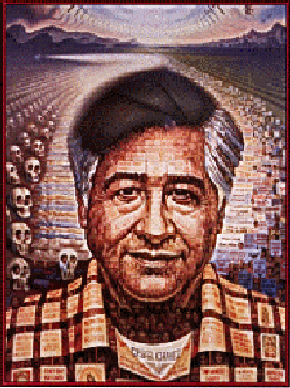
Chronology of the Life of Cesar Chavez
Notes
March 31, 1927 --Cesar Chavez is born.
1937 —The Chavez family is forced into migrant work after being expelled from their farm. Cesar's experiences as a migrant worker will eventually lead him to empathize with other migrants and lead to the formation of the UFW.
1944- Cesar joins the Navy.
1948 --Cesar marries Helen Fabela and together they have eight children.
1952-1962 — Cesar is recruited by Fred Ross to join the Community Service Organization (CSO) in 1952. It was here that Cesar developed his passion and skill for organizing the masses. In the 1950's, Cesar, along with Ross, helps CSO become “the most militant and effective Latino civil rights group of its day.” (22)
Sept. 30, 1962 –Cesar resigns from CSO to form the National Farm Workers Association (NFWA), which first convened in Fresno, California.
Sept. 16, 1965 -- Cesar's NFWA and countless other families, vote to join a strike against Delano-area grape growers, thereby beginning the five-year Delano Grape Strike.
March-April 1966 --Cesar and a crowd of strikers undertake a 340-mile Pilgrimage to the state Capitol in Sacramento , drawing national attention to the suffering of farm workers. Through this, an agreement is negotiated with Schenley Vineyards, the first between workers and a company in US history.
1967-1970 —During this period, a plethora of migrant workers boycott and strike powerful Grape companies and growers. Also, the movement becomes famous and millions of Americans support the farm worker's cause.
February-March 1968 —Similar to Gandhi, Cesar fasts for 25 days in an attempt to rededicate his movement to nonviolence. It was here when U.S. Senator Robert F. Kennedy famously called Cesar "one of the heroic figures of our time."(23)
Summer 1970 -- Cesar orders a national boycott of lettuce.
May 11- June 4, 1972 --Cesar again fasts for 25 days in Phoenix over the Arizona legislature passed a law which banned farmworkers to strike or boycott. During these fasts, famous civil rights activists and popular ethnic heroes often visited Cesar.
Mid-to-late 1970s —UFW candidates win many elections in state legislators and continue to gain widespread support throughout the US. The boycotts and strikes are also extremely successful in improving conditions for the farm workers.
1984 —Cesar calls for a third boycott of Grapes after Republican George Deukmejian is elected California governor, largely due to grower-company contributions. As a result, Deukmejian clamps down on farm worker rights.
July-August 1988 —Cesar conducts his third – and last – fast for 36 days, calling attention to the plights of farm workers, their families, and the affects of pesticides.
Spring-summer 1992 -- Cesar leads vineyard walkouts, which led to the grape workers worker's “ first industry-wide pay hike in eight years.”(24)
April 23, 1993 --Cesar Chavez dies serenely in his sleep and is mourned by 40,000 fans and supporters six days later in Delano . He is presented the Medal of Freedom by President Bill Clinton in 1994. Latinos have remembered Cesar as a symbol of hope to all those marginalized within society and he has become perhaps the most recognized and revered name in Latino culture.